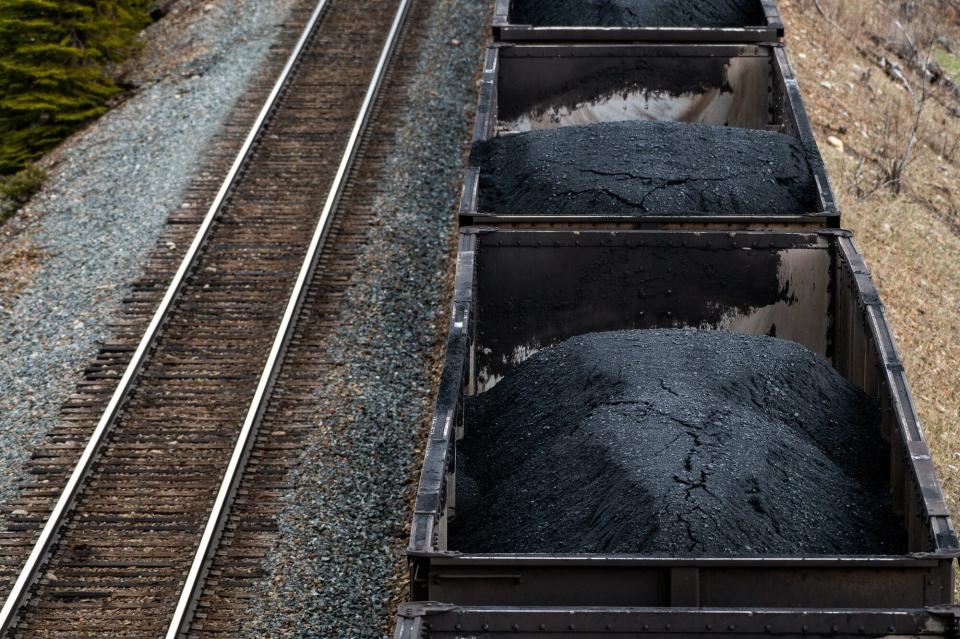Glencore Coal Deal Approved by Canada as Teck Plans Buyback
(Bloomberg) -- Canada has approved Glencore Plc’s $6.9-billion acquisition of Teck Resources Ltd.’s metallurgical coal business, while the latter announced a $2 billion share buyback and pledged to boost copper output.
Most Read from Bloomberg
Kamala Harris Is Having a Surprise Resurgence as Biden’s Campaign Unravels
Singapore Couples Are Marrying Earlier to Buy Homes, Leading Some to Regret
Biden’s Fourth of July Shrouded by Pressure to Drop 2024 Bid
An Insider’s Guide to Keir Starmer’s 100-Day Action Plan for UK
Teck Chief Executive Officer Jonathan Price said the transaction with Glencore marked a new era as the company focused on metals for the energy transition.
“We will build on our core portfolio of strong, cash-generating assets through development of our near-term copper growth projects,” Price said in a statement. Completion would provide substantial funding, giving Teck a pathway to increase copper production by a further 30% as early as 2028, he said.
Earlier, the Canadian government approved the coal deal, although there were several stringent conditions to protect local jobs and the environment.
Industry Minister Francois-Philippe Champagne approved the Glencore transaction of the British Columbia-based business, Elk Valley Resources, late Thursday after sources told Bloomberg the announcement was imminent.
In the deal announced last fall, Swiss commodities trader Glencore will acquire a 77% stake in Teck’s coal business, while steelmakers Nippon Steel Corp. and Posco — which own minority stakes in Teck coal mines — will hold the rest.
In a statement, Champagne said the government had secured a commitment from Teck to reinvest a significant amount of the proceeds into its copper growth portfolio, positioning the company for leadership in critical minerals.
He also raised the bar for approval of any future foreign transactions involving large Canadian mining companies engaged in significant critical minerals operations. Moving forward, any such acquisitions will only be found to be in Canada’s interest in “the most exceptional of circumstances.”
“Today’s decision will result in a well-capitalized Teck that is better able to pursue its ambitions as a major Canadian mining player in critical minerals,” Champagne said.
The two companies spent much of last year in a bitter public fight after Teck rejected an unsolicited $23 billion offer from Glencore, which proposed creating two new metals- and coal-focused companies. The Glencore offer, while unsuccessful, was enough to disrupt an earlier plan by Teck to spin off its coal business.
For Teck, the ultimate deal ended its struggle to find a solution for its mines that produce steelmaking coal after years of studying various options, while securing the cash it needs to fund its metals business.
Champagne said Glencore made legally binding pledges to: establish and maintain a head office for Elk Valley Resources in Vancouver; maintain regional offices in Calgary and Sparwood, BC; ensure that a majority of its directors are Canadians and at least 66% of all executives and senior managers are Canadians — all for at least the next 10 years.
For the next five years, it must maintain “significant employment levels” at Elk Valley Resources, Champagne said.
Glencore has also made binding environmental commitments, he said, including taking responsibility for stewardship through to 2050 — even if it sells or disposes of the asset — and investing an additional C$350 million ($257 million) in rehabilitation and closure activities over five years.
Finally, Glencore agreed to maintain Teck’s “leading commitments” to Indigenous people, including honoring existing pledges to communities and boosting their participation in benefits from the business, including job and procurement opportunities.
“Canada welcomes foreign investment and acknowledges its importance to the mining sector,” said Champagne, though he warned: “The government will not hesitate to act when it is of the view that a transaction would be harmful to Canada’s economic interests or the environment.”
In explaining his decision to raise the standard for approval of future acquisitions involving large Canadian critical minerals firms, he said it was spurred in part by the “circumstances that led to this transaction.”
“Canadians cannot ignore that we are in a world of geopolitical competition, with critical minerals at the very core of advanced industrial and defense policies,” he said.
Large mining takeovers by foreign companies have been a touchy topic in Canada ever since a wave of deals more than 15 years ago took out some of the country’s biggest players, including nickel miner Inco Ltd. and aluminum producer Alcan Inc. When BHP Group proposed a takeover of Potash Corp. of Saskatchewan in 2010, then-Prime Minister Stephen Harper’s government blocked the deal on the grounds that it wouldn’t be of “net benefit” to the country.
Teck’s BC coal mines have been under heightened scrutiny with pollution seeping into a watershed shared with Idaho and Montana becoming a sore spot for US relations — enough so that US President Joe Biden and Trudeau issued a joint statement last year committing to “reduce and mitigate” the impacts of water contamination in the region.
(Adds details of buyback)
Most Read from Bloomberg Businessweek
Dragons and Sex Are Now a $610 Million Business Sweeping Publishing
For Tesla, a Smaller Drop in Sales Is Something to Celebrate
The Fried Chicken Sandwich Wars Are More Cutthroat Than Ever Before
©2024 Bloomberg L.P.

 Yahoo Finance
Yahoo Finance 


